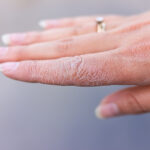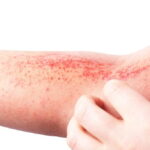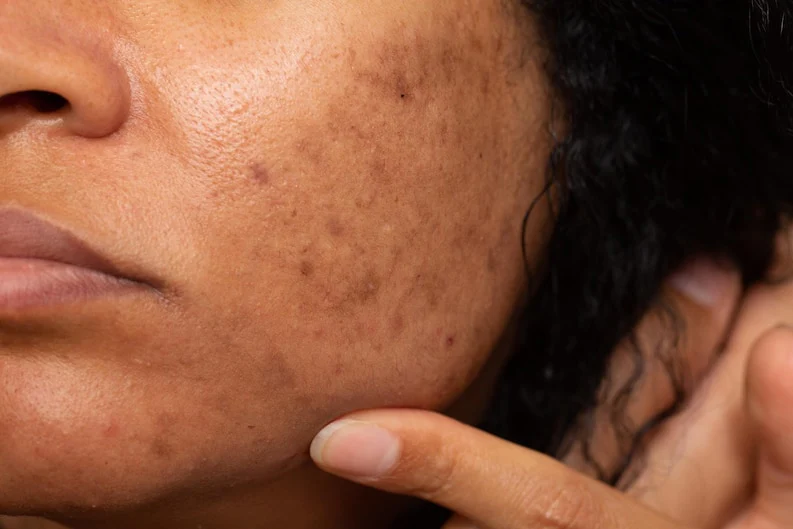Saffron Benefits for Skin
Before delve into saffron benefits for skin Let us understand what saffron really is. Saffron is a striking red spice derived from the saffron crocus plant (Crocus sativus), specifically from the dried stigmas, which are the female reproductive parts of the flower.
This exquisite spice is believed to have originated in Greece and is now cultivated in various countries, including Iran, Spain, and China.
Traditionally, saffron has been prized for its ability to enhance the color and flavor of culinary dishes. Beyond its culinary uses, saffron has also been employed as an herbal remedy for various health issues, such as back pain, wounds, and abscesses.
In addition to its culinary and medicinal applications, saffron has found a significant place in the cosmetics industry. Many people tout its benefits for addressing common skin problems, including inflammation and acne. Some of these assertions are supported by scientific research.
In this article, we will delve into the available research on saffron’s benefits for the skin and provide insights on how to effectively incorporate saffron into your skincare routine.
Proven Benefits of Using Saffron for Skin
Saffron offers a range of skin-friendly properties that have been supported by research. Here’s how saffron can benefit your skin:
Protects Against UV Radiation
One of the most effective ways to maintain skin health is by protecting it from ultraviolet (UV) radiation. UV rays can lead to the production of free radicals, which cause oxidative stress, damaging skin cells and accelerating the aging process.
Crocin, the active compound in saffron, has shown promise in this area. A 2018 laboratory study found that crocin possesses strong antioxidant properties, which help reduce oxidative stress by neutralizing free radicals. The study indicated that crocin provides protection against ultraviolet A (UVA) rays, known to contribute to premature skin aging.
Moreover, another 2018 study also highlighted crocin’s effectiveness against ultraviolet B (UVB) rays, further supporting its role in preventing early skin aging.
Fights Inflammation
Inflammation is a key factor in many skin-related diseases, often triggered by oxidative stress. The antioxidant properties of crocin may play a vital role in combating this oxidative stress and inflammation. The aforementioned 2018 study revealed that crocin can suppress the expression of various inflammatory proteins.
Additionally, a separate 2018 animal study demonstrated that crocin improved symptoms of atopic dermatitis in mice. This condition, often caused by allergens such as house dust mites, is similar to what many humans experience, suggesting saffron’s potential for alleviating skin inflammation in various contexts.
Overall, saffron’s unique properties make it a valuable addition to skincare routines, offering protective and anti-inflammatory benefits for healthier skin.
Supports Wound Healing
Effective wound healing is crucial for maintaining healthy skin, as it reduces the risk of complications like infections and scarring. Research indicates that saffron may play a beneficial role in this process.
In a 2008 animal study, researchers found that a cream containing saffron extract significantly improved wound healing in mice. The application of saffron increased the growth of skin cells, a vital factor in closing wounds effectively. This healing effect is attributed to the antioxidant and anti-inflammatory properties inherent in saffron.
Furthermore, a 2017 laboratory study reinforced these findings by demonstrating that saffron stimulates wound healing through promoting cell multiplication.
While further research involving human subjects is necessary to fully understand saffron’s capabilities in wound healing, these preliminary results suggest that it holds promise as a natural aid in enhancing skin recovery.
Reduces Hyperpigmentation
Hyperpigmentation occurs when certain areas of the skin become darker than the surrounding skin, often due to excess melanin production. This condition can result from various factors, including scarring, sun exposure, and hormonal changes.
A 2013 study involving human participants revealed that saffron’s active compounds, particularly crocin, can effectively reduce melanin levels in the skin. These compounds work by inhibiting the activity of tyrosinase, an enzyme critical for melanin production.
By reducing melanin synthesis, saffron may help diminish the appearance of hyperpigmentation, leading to a more even skin tone.
Overall, the ability of saffron to support wound healing and reduce hyperpigmentation highlights its potential as a valuable ingredient in skincare, offering a natural approach to promoting healthier, more radiant skin.
Top 8 Benefits of Saffron for Skin
Beyond its distinctive sweet aroma, saffron, also known as Kesar, is rich in antioxidants, as well as vitamins A, B, and C, along with crocin. These properties grant saffron a variety of benefits, ranging from skin brightening to enhancing overall skin texture.
Here are eight key benefits of saffron for skin that highlight why you should consider incorporating this remarkable ingredient into your skincare regimen.
- Anti-Aging Saffron is a luxurious spice that offers anti-aging benefits thanks to its abundance of antioxidants, vitamins, and minerals. Its anti-inflammatory properties help reduce skin damage, improve texture, and address issues such as acne and blemishes.
- Protection Against Sun Damage As a powerful antioxidant, saffron provides significant protection against sun damage by neutralizing harmful free radicals. Its bioactive compounds, like crocin and crocetin, promote skin health, minimize the risk of sunburn, and prevent long-term skin damage.
- Skin Moisturizing Known for its soothing anti-inflammatory and antioxidant properties, saffron is a valuable addition to skincare routines. It helps alleviate irritated skin, reduce redness, and enhance overall texture, making it a highly beneficial ingredient.
- Pigmentation Treatment Saffron’s rich antioxidants, anti-inflammatory properties, and vitamins and minerals make it effective in treating pigmentation issues. Regular use can lighten hyperpigmentation and age spots while soothing irritated skin and improving overall texture and radiance.
- Skin Brightening Celebrated for its vibrant color and unique flavor, saffron also provides skin-brightening effects. Its high concentration of antioxidants, such as crocin and crocetin, helps reduce pigmentation, dark spots, and free radical damage, promoting a more even skin tone. Additionally, saffron’s anti-inflammatory properties soothe the skin, diminishing redness and blemishes for a radiant complexion.
- Improving Skin Texture The luxurious properties of saffron work to improve skin texture. Its rich vitamins and minerals hydrate the skin, imparting a healthy glow. Regular application can help lighten skin tone, reduce pigmentation, and achieve a more uniform complexion. Moreover, saffron’s antifungal properties assist in treating acne and other skin blemishes.
- Treatment of Skin Inflammation Saffron’s anti-inflammatory properties are effective in managing skin inflammation by reducing swelling and redness. Its antioxidant qualities combat free radicals, promoting skin rejuvenation and healing. Additionally, saffron hydrates the skin, contributing to a healthier appearance. Regular use can soothe irritated skin, alleviate symptoms of acne and rosacea, and enhance overall skin health.
- Reduction of Under-Eye Dark Circles Saffron is particularly beneficial for reducing under-eye dark circles, thanks to its anti-inflammatory and antioxidant properties. It helps soothe the delicate skin in this area, reducing puffiness and promoting better blood circulation. Saffron also hydrates and nourishes the skin, improving texture and tone. Regular use of saffron-infused treatments can visibly diminish dark circles and create a brighter, more refreshed appearance.
Does Saffron Oil Have Any Benefits?
Saffron oil, like the dried spice, is derived from the Crocus sativus flower. This oil is produced by extracting the oil from the flower’s stigmas, which are the same parts used to create saffron spice.
Saffron oil contains crocin, the active compound that contributes to the skin benefits of saffron. Consequently, saffron oil may offer potential advantages for improving skin health as well.
Unproven Claims
Despite its promising qualities, there are several claims about saffron that have been found to be unsubstantiated in the context of skincare.
Doesn’t Hydrate Skin
Many people believe that saffron can effectively hydrate and moisturize the skin. However, a 2010 study demonstrated that this is not the case. In this research, participants were divided into two groups: one received a lotion containing saffron, while the other was given a lotion without saffron.
The results showed no significant difference in skin moisture levels between the two groups, indicating that saffron does not possess hydrating properties.
Doesn’t Fight Acne
While saffron’s anti-inflammatory and wound healing properties suggest it could be beneficial for treating acne, there is currently no scientific evidence to support this claim.
A 2016 study did find that saffron exhibits antibacterial properties, but it specifically focused on foodborne bacteria rather than the types of bacteria that contribute to acne. Thus, more targeted research is needed to determine whether saffron can be considered an effective treatment for acne.
Overall, while saffron oil has some potential benefits for skin health due to its active compounds, it’s important to be cautious of unproven claims and seek further research to substantiate its effectiveness in specific skincare applications.
Saffron Skin Care Uses
If you’re interested in incorporating saffron into your skincare routine, consider the following methods. While saffron is generally well-tolerated, it’s important to keep in mind that it can still cause allergic reactions in some individuals. If you notice any signs of an allergic reaction, such as redness or irritation, discontinue use immediately.
- Saffron Face Mask
For a soothing skin treatment, you can create a saffron face mask. Start by crushing 3 strands of saffron using a mortar and pestle. Mix the crushed saffron with 1 tablespoon of honey, then apply the mixture evenly to your skin. Leave it on for 10 minutes, then rinse off with lukewarm water and pat your skin dry.
- Saffron Gel for Face
Saffron gel provides a cooling effect that is ideal for reducing inflammation. To make the gel, crush 4 or 5 strands of saffron in a mortar and pestle. Combine this with 2 tablespoons each of aloe vera gel and rose water. Apply a small amount to your skin, gently rubbing it in until fully absorbed.
- Saffron Face Toner
You can enhance the benefits of witch hazel or rose water by infusing them with saffron. Pour ½ cup of witch hazel or rose water into a spray bottle and add 3 to 4 strands of saffron. Allow the mixture to soak for 1 to 2 days. Spray it on your skin or apply it with a cotton ball for an added refreshment.
- Saffron Oil Moisturizer
To create a saffron oil moisturizer, combine saffron oil with a base oil. Fill a 1-ounce bottle about two-thirds full with a carrier oil, such as almond oil or grapeseed oil. Add 3 to 5 drops of saffron essential oil, then apply the mixture to your skin using clean fingers.
Precautions and Side Effects
Saffron is generally safe for use, with minimal side effects reported. However, as with any plant substance, it can trigger allergic reactions in some individuals.
For instance, a 2015 study found that saffron workers in India developed contact dermatitis due to saffron exposure. Additionally, a 2007 study noted that saffron pollen could lead to allergic reactions affecting the skin or respiratory system.
Possible signs of an allergic reaction include:
- Sneezing
- Runny nose
- Itchy, red eyes
- Dry skin
- Skin rash (redness and swelling)
- Itchy or burning skin
- Hives
Pregnant individuals should avoid using saffron in any form. According to a 2014 study, saffron may promote uterine contractions, increasing the risk of miscarriage.
Always consult with a healthcare professional before using saffron or any new ingredient in your skincare routine, especially if you have underlying health conditions or concerns.
Where to Buy Saffron Skin Care Products
If you’re looking to purchase dried saffron or saffron-infused skincare products, you can find them at a variety of locations, including:
- Health Markets: Many health food stores offer saffron supplements and skincare products that utilize saffron’s beneficial properties.
- Grocery Stores: Look for saffron in the spice aisle of larger grocery stores, where you may also find saffron-infused creams or oils.
- Spice Shops: Specialty spice shops often carry high-quality saffron, as well as saffron-based products.
- Herbal Medicine Shops: Stores that focus on herbal remedies typically have saffron available, both as a spice and in various skincare formulations.
- Apothecaries: Traditional apothecaries may offer saffron products alongside other natural remedies, including skincare options that feature saffron as a key ingredient.
Before purchasing, it’s a good idea to check product labels for quality and purity, especially with saffron, as it can be expensive and often has varying grades.
Benefits of Eating Strawberries
Benefits of Eating Pomegranate

A graduate of Computer Science and Information Management Technology. Diploma – Caregiving, Certificates – Dementia and Diabetes Awareness and Management. A researcher, blogger, songwriter, singer and acoustic guitarist. Born in an environment where natural talents such as healing are imparted at our natural birth. This natural talents of healing is the result of our genetic inheritance and the training from family environment.























